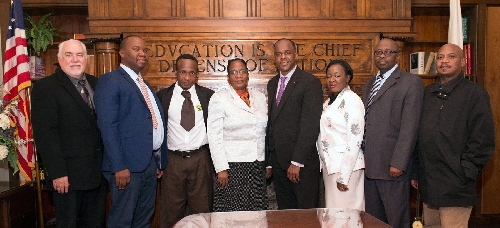University News
Botswana Delegation Visits WIU to Examine Administrative Processes and Western Illinois Agricultural Systems
October 20, 2015
MACOMB, IL – Last week, six administrators from the University of Botswana's College of Agriculture and Natural Resources visited Western Illinois University to not only learn about Western's administrative systems, but to also observe the agricultural setting in which WIU is situated. After arriving in Macomb early last week and visiting with members of Western's administration, the delegation left WIU's location in the U.S. Corn Belt—but not before they were able to visit a few of the WIU School of Agriculture's facilities and hear from agriculture faculty and students.
According to Rejoice Tsheko, associate professor at the University of Botswana's College of Agriculture and Natural Resources, the delegation came to Macomb to "benchmark" Western's systems and processes, as he and his colleagues are in the process of transitioning the University of Botswana's College of Agriculture and Natural Resources to a stand-alone institution—the Botswanan University of Agriculture and Natural Resources—on the same campus in Gaborone.
"This has been approved by our parliament, and the effective date for the new institution will be some time in December," Tsheko said. "Because of the agriculture production in this area, as well as our ties to Western, we chose to come here as one of the institutions we're visiting while in North America. Our visit will help us set benchmarks for our own institution's processes and programs. In addition, we hope to develop an exchange program, for both faculty and students, so our students and faculty could learn from the people here at Western and vice versa."
The ties to Western Tsheko mentioned stem from a 2013 visit Richard Carter (executive director of the School of Distance Learning, International Studies and Outreach) made to Botswana, when he visited with Her Excellency Tebelelo Seretse. In turn, Her Excellency visited the Macomb campus in late April the same year.
"It was a privilege to represent Western Illinois University in Botswana. The people I met while there were extremely warm and friendly, with a strong desire to build educational bridges with Western," Carter noted. "This most recent visit from Rejoice and his colleagues is a solid start to building those bridges, and we have high expectations for our continuing relationship with the newly formed Botswanian University of Agriculture and Natural Resources."
While in Macomb, Kgomotso Molefe, explained the need to increase agricultural production in the Republic of Botswana. She said that is one of the reasons behind the formation of a new higher education institution dedicated solely to the study of agriculture and natural resources in her country.
"In terms of the agriculture industry's contribution to GDP [Gross Domestic Product] in Botswana, it is about two percent, on the lower side. We import a huge percentage of food from South Africa," she explained. "When we became independent in 1966, the industry's contribution to the GDP was around four percent. To increase the agricultural industry's GDP contribution level, the government has been trying to come up with initiatives to increase production," Molefe noted.
"Our government found that universities should have a bigger role in developing the manpower and production systems needed to not only expand the agricultural industry but also our natural resources," Tsheko added.
As result of the delegation's visit, a two-part Memorandum of Understanding (MOU) is underway between Western and the new institution.
"The first part is an agreement between our two institutions," Carter explained. "The second part will be about the exchange agreement, which will provide a program for WIU students to go to Botswana and in exchange, students from Botswana can come to WIU. Most likely, that will be available for one-two students per year."
Carter and Tsheko are hopeful that the exchange part of the MOU agreement can begin in about six months.
"We also have a similar agreements in place with other institutions in Europe, so that's why we are optimistic it can be implemented in six months to a year," Tsheko said.
WIU President Jack Thomas said the delegation's visit to the Macomb campus serves not only to further enhance internationalization efforts, but provides even greater educational opportunities for WIU and Botswanan students and faculty.
For more information, contact the School of Distance Learning, International Studies and Outreach at (309) 298-1929.
Posted By: Teresa Koltzenburg (WIUNews@wiu.edu)
Office of University Communications & Marketing


Connect with us: